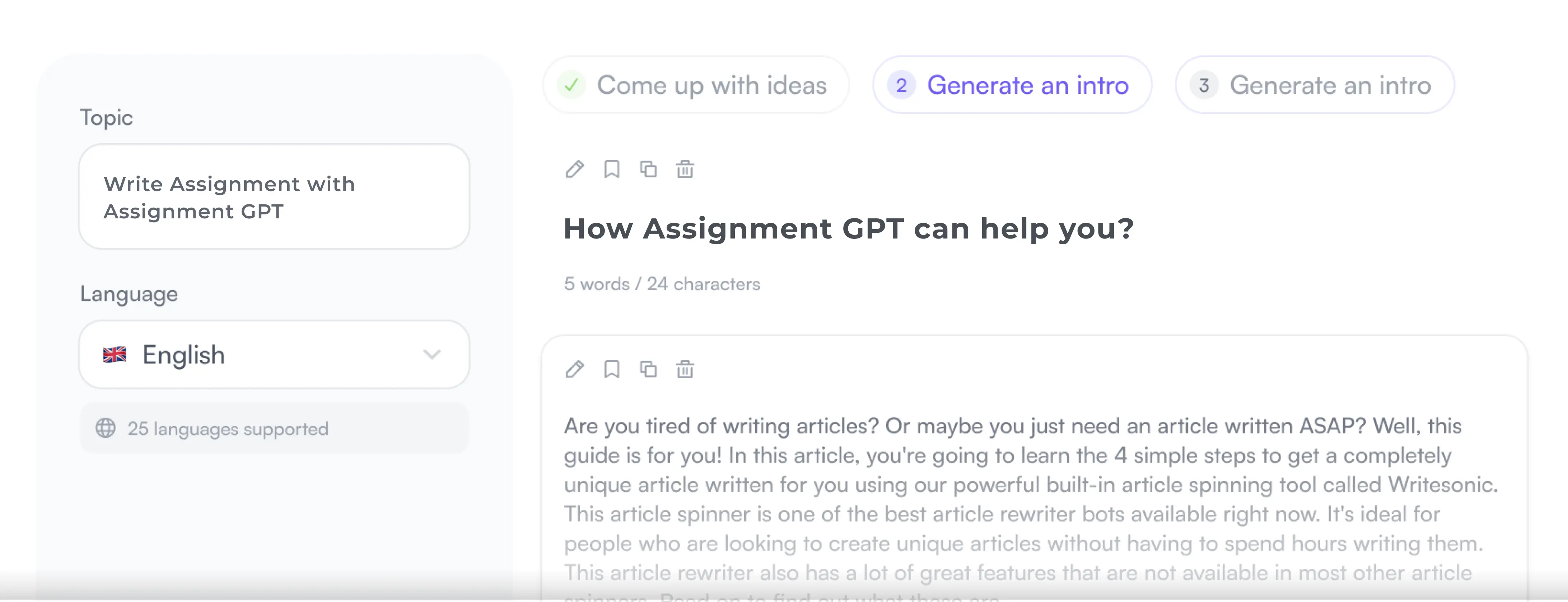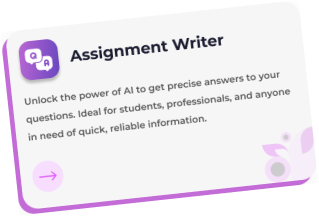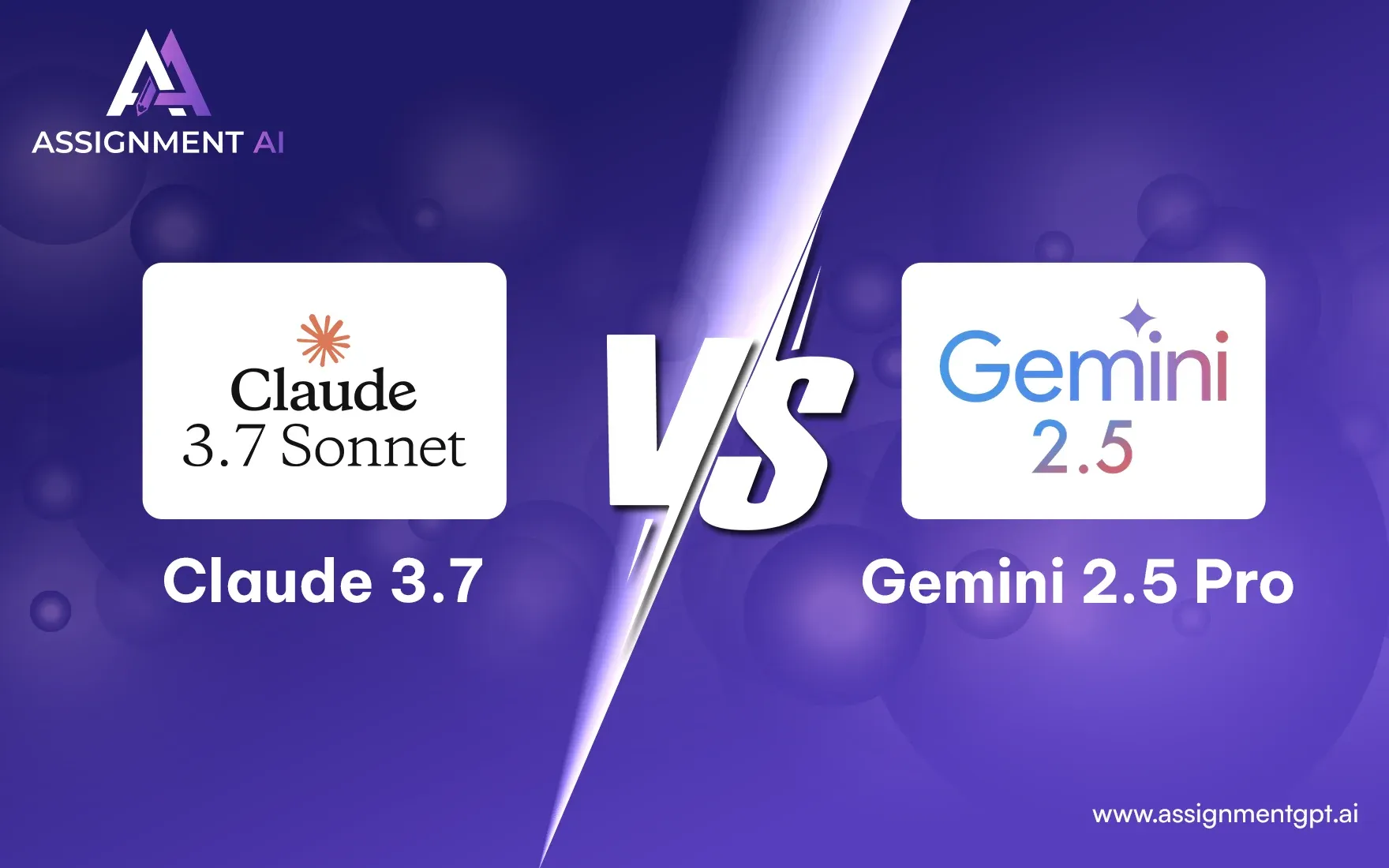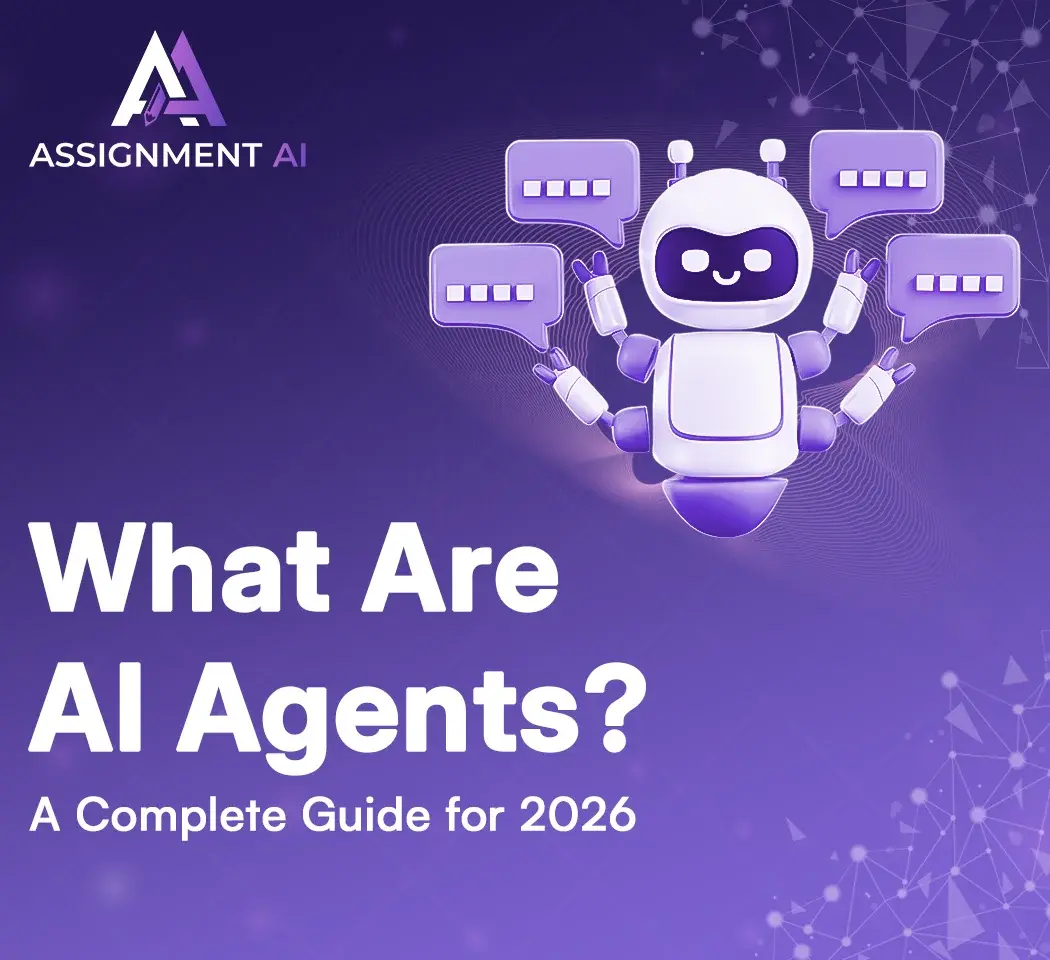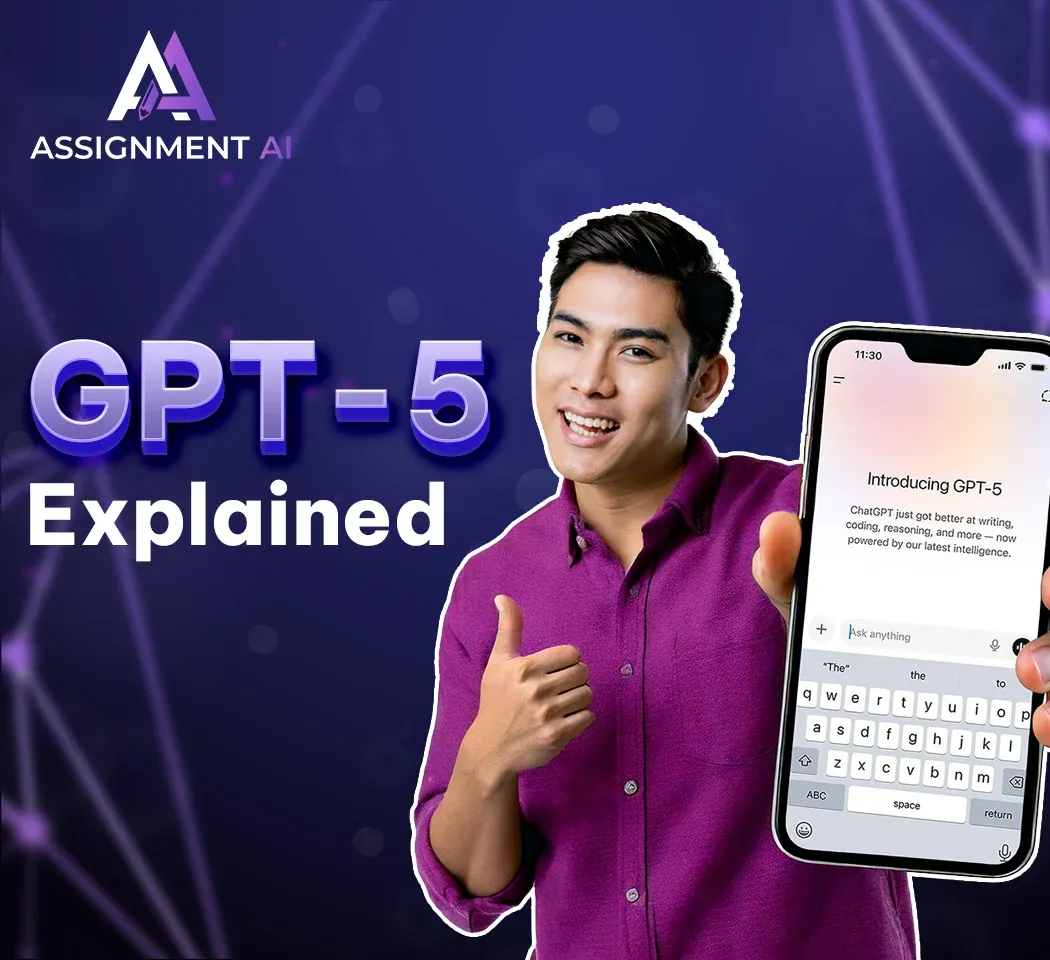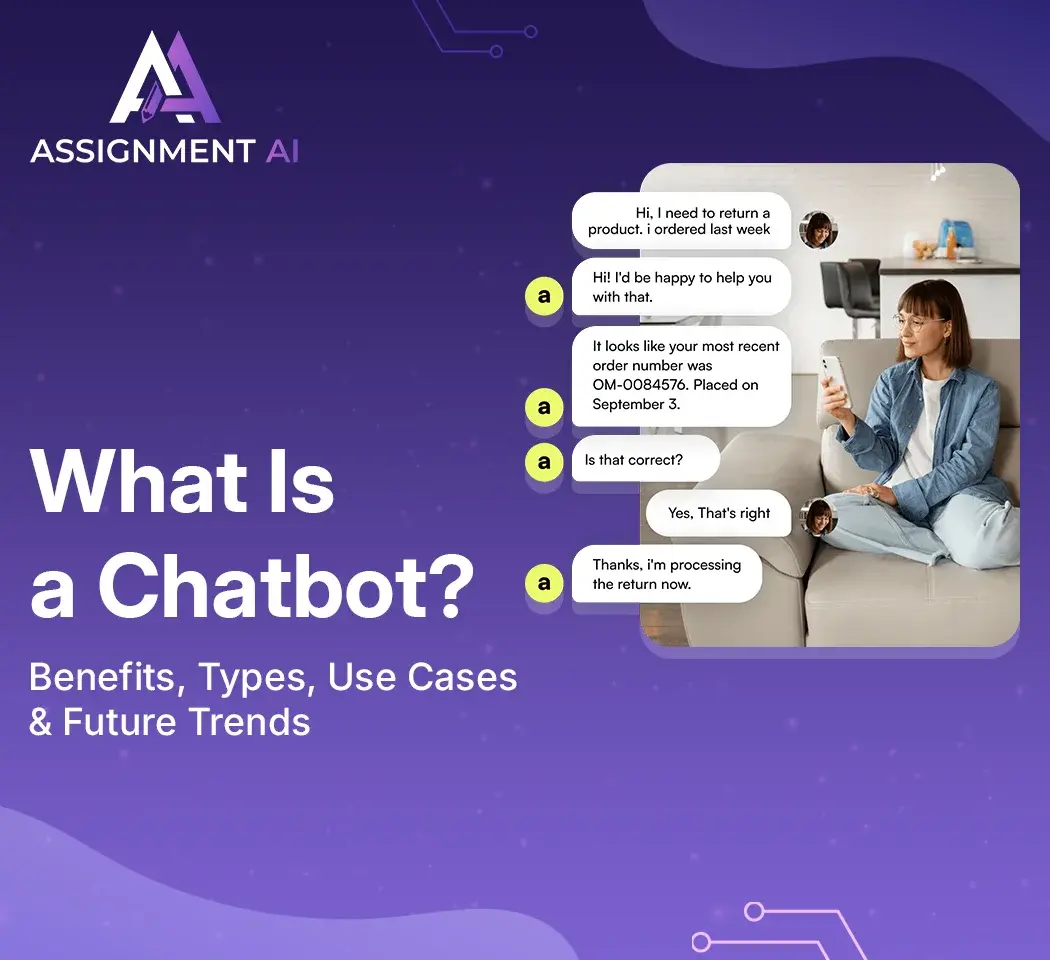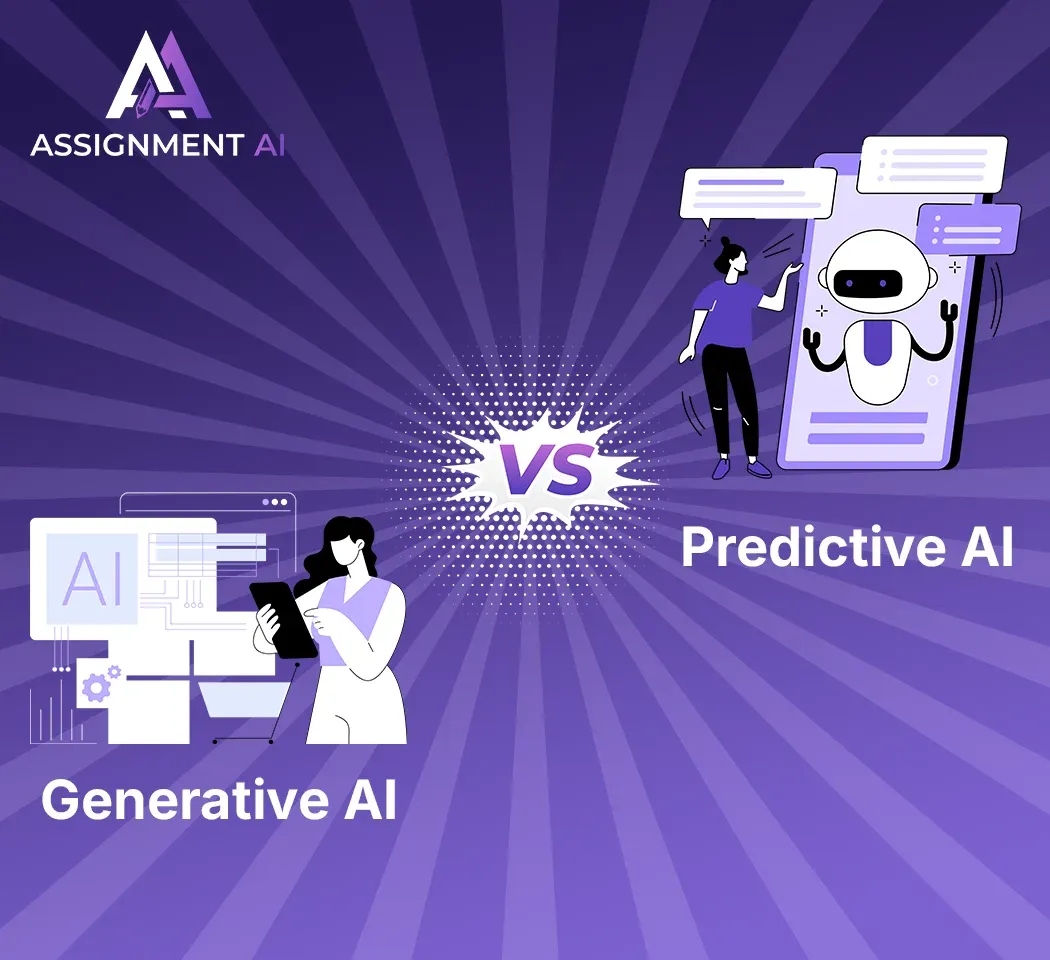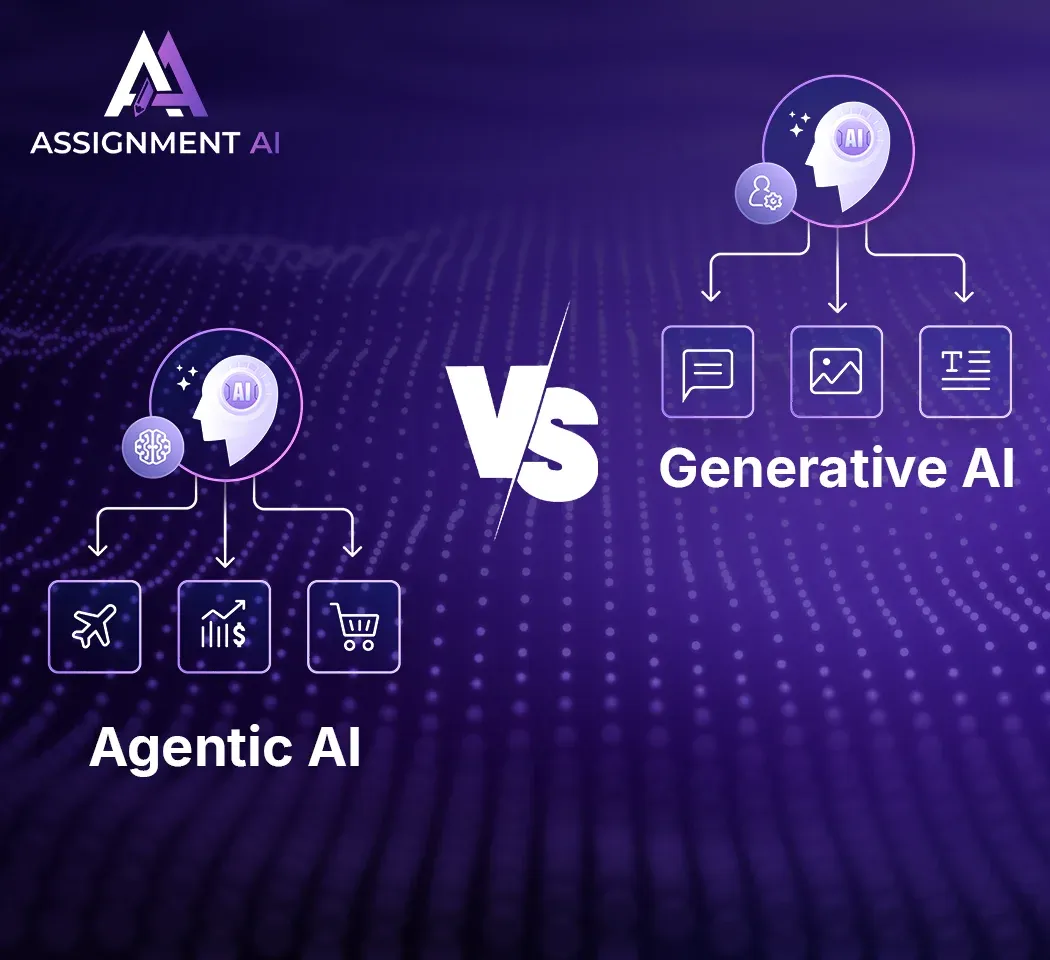AssignmentGPT Blogs
Just imagine that you have to complete a massive software project in 7 days, and the complexity and expectations of your project are very high, and you have to complete this project by yourself, even then, people will say that this is hardly possible. But if I tell you that two AI models, Cloud 3.7 Sonnet and Gemini 2.5 Pro, can practically help you in your project, they can also help you in completing your project in 7 days, and these two models will become your coding friend and guide you. Then you will also be excited to hear this: is this really possible? And how exactly can this happen?
In 2025, AI models will become much more advanced, and Anthropic's Claude 3.7 Sonnet and Google's Gemini 2.5 Pro will be leading the AI model industry. Both these platforms claim to be the smartest AI models for coding purposes. All models want to prove themselves as coding experts because software development is a very advanced and high-paying sector, if AI models can do complex tasks like coding quickly, then it will save a lot of cost for the companies in maintaining a team of software developers and according to Zoho’s founder Sridhar Vembu approx 90% of coding jobs will replace by Ai Models in next few years and in return AI models will also be able to do good business.
If you are also thinking which model I should use for my coding purposes and which is the best platform then let me tell you that you have visited the right article. In this detailed article, we will compare the capabilities, pros-cons and performance of Cloud 3.7 and Gemini 2.5 Pro and also do real-world applications tests and guide you which model is best according to your work and needs.
Quick Summary
As we already know, software development or coding-related tasks are very complex, time-consuming, and stressful. There are many advanced models available in the market to replace and help human coders but Gemini 2.5 Pro and Cloud 3.7 are considered to be one of the most advanced models.
The Gemini 2.5 Pro model is considered to be much faster and more powerful because of these advances in creative coding, large-scale development, and multimodal integration. This model currently also provides free access, which makes it much more budget-friendly compared to Cloud.
Cloud 3.7 Sonnet Model is also a very advanced model but its working model is slightly different compared to Gemini 2.5 Pro Model except that it prioritizes precision features which is excellent for debugging, documentation, and logical clarity. Its extended thinking mode feature provides the user with features of deeper reasoning or step-by-step problem-solving. It is best for developers who need accuracy and structured support overall.
So let's try to understand both models in detail so that you can use the right model for coding purposes. For developers looking at comprehensive AI coding solutions, our guide on top AI tools for developers covers various options beyond these two models.
What is Claude 3.7 Sonnet?
Claude 3.7 Sonnet, released in February 2025, is the latest iteration of Anthropic's Claude model series. Many people think that this is also a Chatbot but it is not at all, it is a quite advanced model. This Ai model is built around deep reasoning and accurate decision-making, especially in coding and content creation.
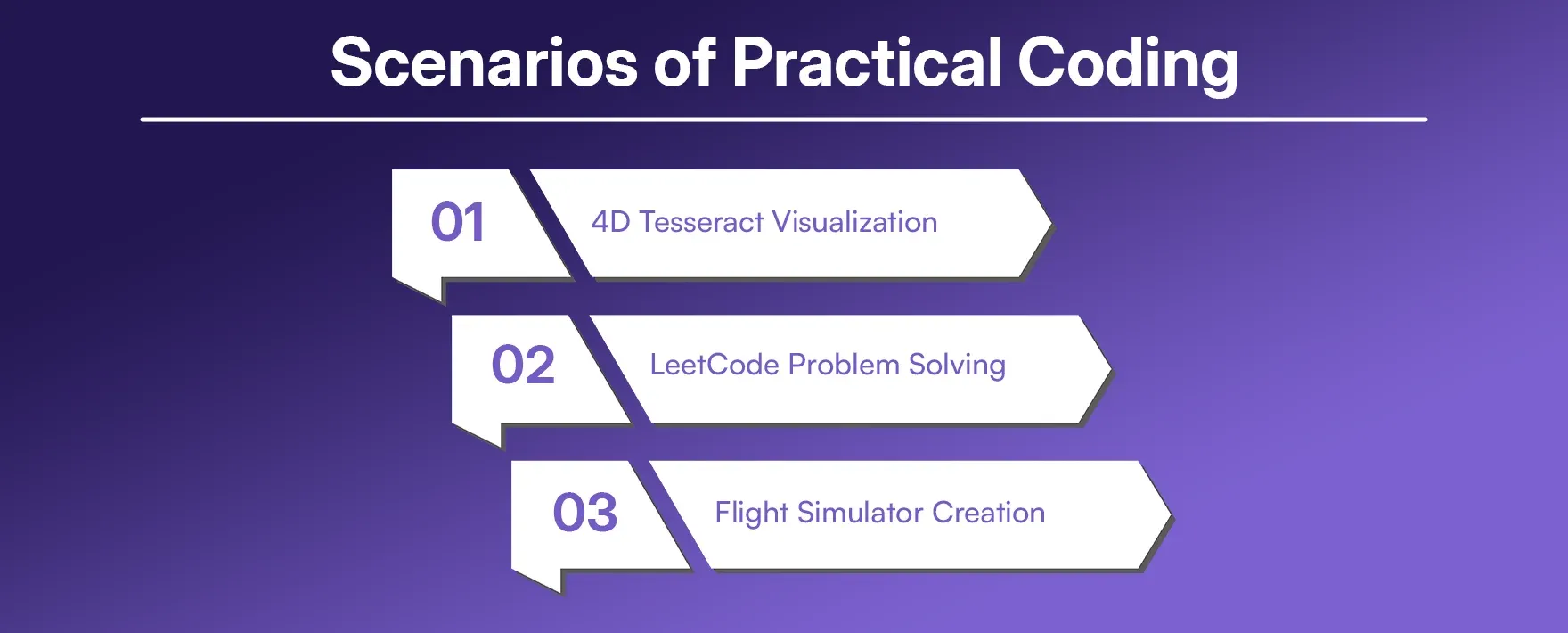
Key Features
Hybrid Reasoning Engine: This offers standard and extended modes. The extended thinking mode of Claude 3.7 Sonnet is good in debugging and logical tasks.
Strong in software engineering: This Model performs well in front-end and back-end development tasks. Basic software development like this can be done quite quickly.
Availability: Claude 3.7 Sonnet is accessible via Claude.ai, Amazon Bedrock, and Google Cloud's Vertex AI.
Claude 3.7 is known for acting like a reliable coding mentor. Its output may not always be the fastest, but it’s often the most understandable. And this model is also popular for its very simple interface. To understand Claude's evolution and capabilities, you can learn more about Claude 3.5 Sonnet which preceded this version.
What is Gemini 2.5 Pro?
Gemini 2.5 Pro released in March 2025, Gemini 2.5 Pro is Google's most advanced model yet. Due to Google's branding, this model is becoming very popular among coders. It’s not only great at code but also at reasoning, multimodal tasks, and large-scale problem-solving.
Key Features
Higher Token Context: In this, coders have got a limit of 1M token context window and Google sources say that it can soon expand to 2M.
Multimodal capabilities: Due to the integration of Google search engine and user data of different Google products, this model can easily handle text, images, audio, and video.
Top performance in benchmarks: Gemini 2.5 Pro can surpass most models in math, logic, and creative coding tasks.
Available on: This model is available for Google AI Studio, Google Cloud, and Gemini App (Advanced subscribers) from where coders can access it.
Cloud and Gemini models are quite advanced, and both are perfect for different users. For broader AI model comparisons, our analysis of ChatGPT vs Microsoft Copilot vs Gemini provides additional context on how these models stack up against other major players.
The Cloud 3.7 Sonnet model is quite precise, while Google Gemini 2.5 Pro is quite powerful due to the branding and database of the Google search engine.
What is the difference between Claude 3.7 and Gemini thinking?
If you prioritize precision, detailed reasoning, and clear explanations, Claude 3.7 Sonnet is the ideal choice. Its strength lies in delivering well-structured, nuanced answers, making it an excellent option for complex problem-solving, teaching scenarios, and tasks that demand in-depth analysis.
On the other hand, if you require speed, scalability, and multimodal capabilities, Gemini 2.5 Pro is the better option. This model excels at handling large-scale projects, multitasking, and creative tasks, particularly in environments involving extensive codebases or where rapid ideation is key. Its ability to work across multiple modalities, like images and text, makes it an incredibly versatile powerhouse for diverse applications.
In essence, Claude 3.7 Sonnet is your go-to for deep cognitive processes and structured reasoning, while Gemini 2.5 Pro shines in speed, creativity, and the handling of complex, multi-faceted tasks at scale. To see how Claude performs against other leading models, check out our detailed Claude vs ChatGPT comparison.
Specifications and Technical Details of Claude 3.7 Sonnet and Gemini 2.5 Pro
| Feature | Gemini 2.5 Pro | Claude 3.7 Sonnet |
|---|---|---|
| Alias | gemini-2.5-pro-exp-03-25 | claude-3-7-sonnet-20250219 |
| Developer | Anthropic | |
| Release Date | March 2025 | February 2025 |
| Primary Use Cases | Reasoning, coding and multimodal | Coding, content creation and RAG |
| Context window | 1,000,000 tokens | 200,000 tokens |
| Max output tokens | 64,000 | 8,192 |
| Multimodal | Text, Image, Audio and Video. | Text and Image |
| Fine tuning | No | No |
| Knowledge cutoff | January 2025 | November 2024 |
| Pricing | Undisclosed (free tier available) | $3 input / $15 output per 1M tokens |
Comparison of Coding Performance
To check the performance of any model, we need to check some basic key areas. We will compare the key areas of Gemini 2.5 pro and Cloud 3.7 Sonnet which include debugging & refactoring, documentation, and code generation, so that we can better understand the performance of both models.
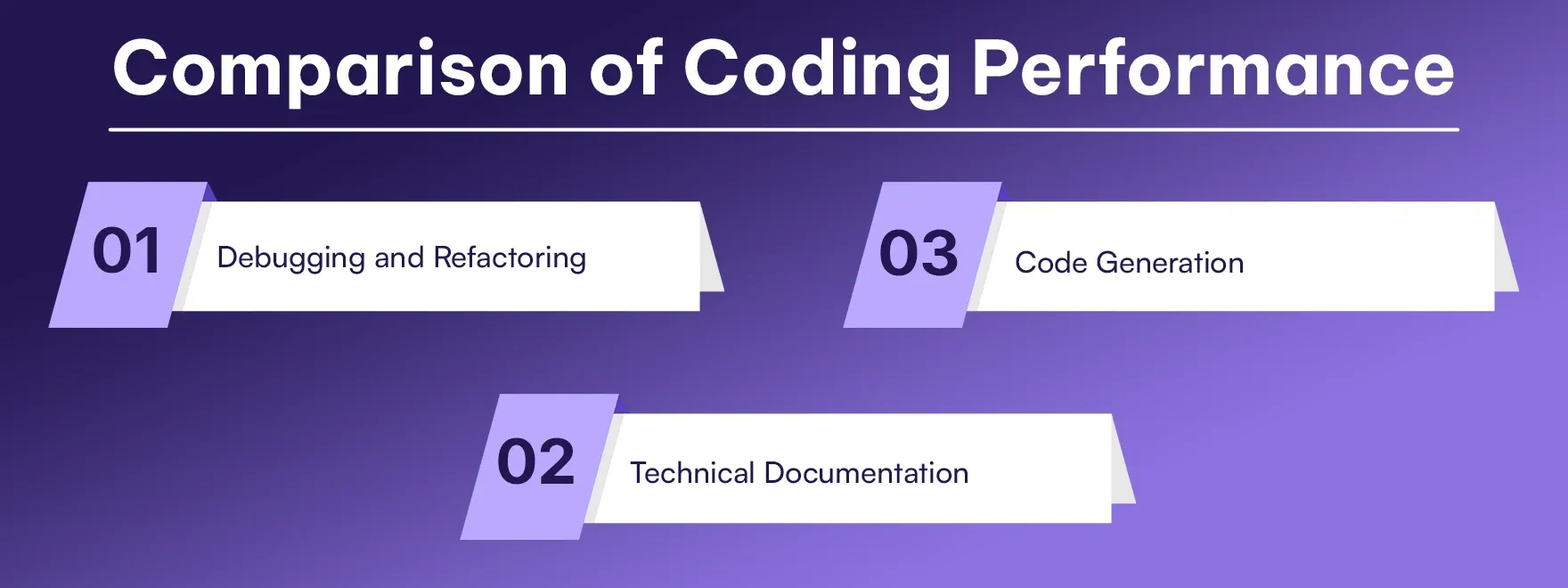
Debugging and Refactoring
Claude 3.7 Sonnet: This model guides the user like a mentor and it explains what went wrong, how to fix it, and why its solution works.
Gemini 2.5 Pro: This model is quite advanced due to the branding of Google search engine and this model can easily fix bugs in large codebases using its huge context window. You can also upload screenshots and it can scan visual codes very well.
Winner: The Cloud 3.7 Sonnet model is known for its accuracy and learning, while the Gemini 2.5 Pro is known for its scale and speed.
Technical Documentation
Claude 3.7 Sonnet: This model offers clear, simplified explanations. Cloud 3.7 Sonnet is ideal for teams needing understandable documentation.
Gemini 2.5 Pro: Using databases of Google products, it generates multimedia-rich docs like charts, visuals, and even video snippets.
Winner: Cloud 3.7 Sonnet is best for clarity, while Gemini is known for its rich and detailed results.
Technical Documentation
Claude 3.7 Sonnet: This model offers clear, simplified explanations. Cloud 3.7 Sonnet is ideal for teams needing understandable documentation.
Gemini 2.5 Pro: Using databases of Google products, it generates multimedia-rich docs like charts, visuals, and even video snippets.
Winner: Cloud 3.7 Sonnet is best for clarity, while Gemini is known for its rich and detailed results.
Code Generation
Gemini 2.5 Pro: This model is best for real-time code generation, and this model can generate a real-time collaborative whiteboard and a flight simulator from simple prompts. And it generates code very fast.
Cloud 3.7 Sonnet: This model is slower but more readable for code generation and it is perfect when you want to understand the logic.
Winner: From a code generation perspective, Gemini is a very good option for speed and Cloud 3.7 Sonnet is popular for its teaching-friendly code generation.
Comparisons of Benchmark

SWE-bench (Software Engineering Benchmark)
SWE-bench, considered a very difficult benchmark of Software Engineering, is a kind of framework used to evaluate language models (LMs) on their ability to solve real-world software engineering tasks. This benchmark focuses on testing how well AI can understand and resolve software issues in a manner similar to how human developers work. This process and these guidelines have been followed in benchmark scoring.
Claude 3.7 Sonnet: 70.3% (Extended Mode)
Gemini 2.5 Pro: 63.8%
Claude Model is much better in real-world software engineering tasks because it is quite effective compared with Gemini.
GPQA Diamond (Graduate-Level Physics Questions)
GPQA Diamond is a highly challenging and advanced subset of the Graduate-Level Google-Proof Q&A (GPQA) benchmark, focusing on exceptionally difficult multiple-choice questions in physics, chemistry, and biology. It comprises 198 questions that even M.Tech. Or Phd-level experts find it difficult to solve and are designed to be "Google-proof".
Claude: 84.8%
Gemini: 84.0%
The Claude Model is slightly better at logical reasoning compared with Gemini 2.5 Pro.
AIME (American Invitational Mathematics Examination)
The AIME (American Invitational Mathematics Examination) is a selective mathematics competition designed for high-performing students, scholars and intelligent graduates. It's a 3-hour exam with 15 challenging questions, where answers are integers between 0 and 999.
Claude: 80.0%
Gemini: 92.0%
Overall, Gemini dominates in math-heavy coding logic.
Scenarios of Practical Coding
However, both these models are quite advanced in line with the coding generation but we run real world coding tests to know how they perform.
1. 4D Tesseract Visualization
Gemini 2.5 Pro: This model can create a perfect 4d tesseract with a bouncing ball and collision physics.
Claude 3.7 Sonnet: overall, this also delivers working code, but adds extra features nobody asked for.
Winner: Gemini is quite good because of efficiency, and Claude has also delivered working code.
2. LeetCode Problem Solving
Gemini 2.5 Pro: This model of Gemini can solve a complex 14.9% acceptance rate problem with clean time complexity. This model is considered best for basic to average coding level.
Claude 3.7 Sonnet: This too could be solved, but the code hit TLE (Time Limit Exceeded).
Winner: Because of problem-solving abilities, Gemini is the best.
3. Flight Simulator Creation
Gemini 2.5 Pro: This model of Gemini delivered a clean, working flight simulator with Minecraft-style visuals.
Claude 3.7 Sonnet: In this test Claude model plane took off sideways and was uncontrollable.
Winner: Gemini
Practical Applications and Use Cases
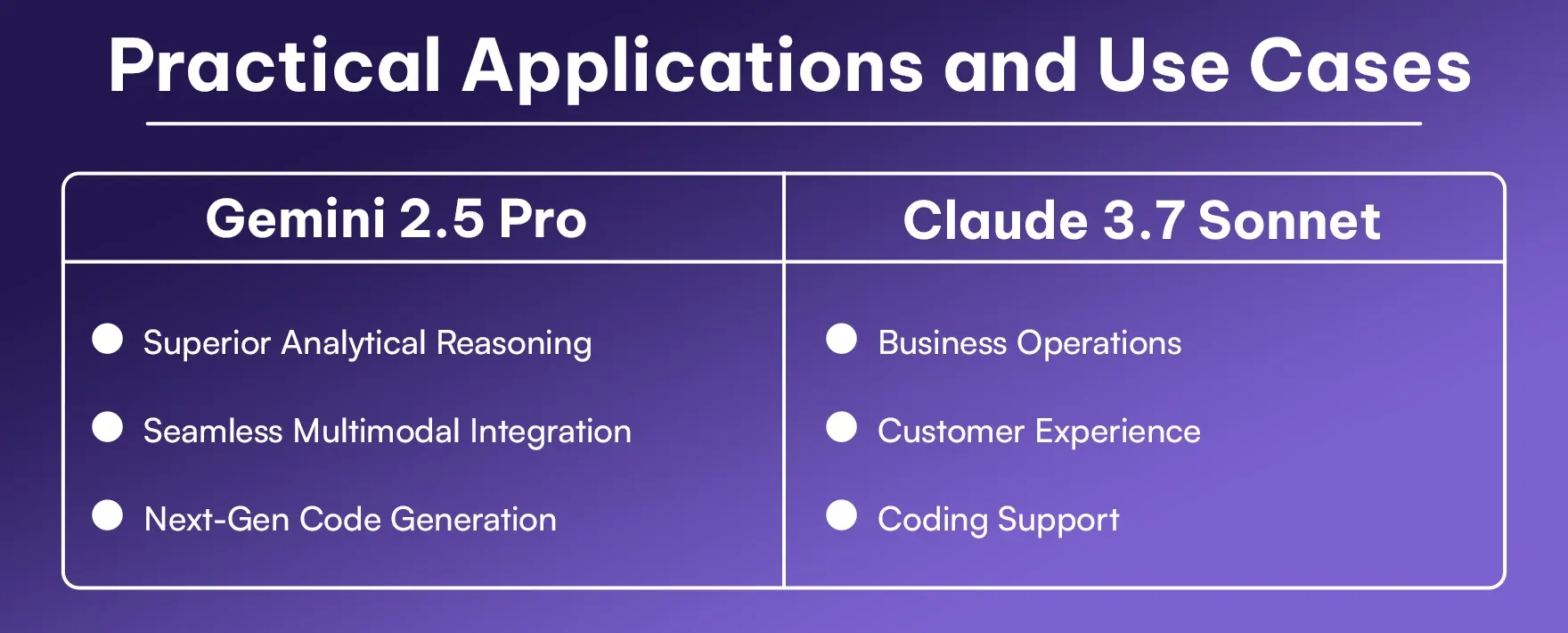
Gemini 2.5 Pro
Next-Gen Code Generation: This model can build complex workflows and dynamic web apps with ease. And this model is quite advanced for code generation.
Superior Analytical Reasoning: Gemini 2.5 Pro is ideal for simulations, models, and business logic reasoning activity.
Multimodal Integration: This model can mix text, image, audio, and video for apps like AR/VR, games, and media tools.
Claude 3.7 Sonnet
Coding Support: Claude model works as your intelligent coding partner or friend, and this model is great for beginner coders for better code clarity.
Business Operations: This model can handle documentation, data summaries, and internal automation.
Customer Experience: Claude 3.7 Sonnet acts as a reliable AI assistant for service, email handling, and summarisation.
Accessibility and Pricing
Gemini 2.5 Pro
Overall free tier is available via Google AI Studio and has paid pricing (per 1M tokens in USD).
Input price: $1.25, prompts <= 200k tokens $2.50, prompts > 200k tokens
Output price (including thinking tokens): $10.00, prompts <= 200k tokens $15.00, prompts > 200k
Context caching price: $0.31, prompts <= 200k tokens $0.625, prompts > 200k $4.50 / 1,000,000 tokens per hour
Grounding with Google Search: 1,500 RPD (free), then $35 / 1,000 requests
And Gemini 2.5 Pro is expected to be cheaper than Claude in future for the commercial tiers.
Cloud 3.7 Sonnet
In anthropological company, we get to see two plans, one is individual and the other is team and enterprises. And we get to see the pricing of Cloud 3.7 Sonnet in this way.
$3 per 1M input tokens
$15 per 1M output tokens
And this model is available via Cloud.ai, Amazon Bedrock, Google Cloud
Cost Winner: Due to its budget friendly pricing and Google branding, Gemini 2.5 pro can be called the best compare with Cloud 2.7 Sonnet.
Conclusion
So finally let us know in detail about Google Gemini 2.5 Pro or Claude 2.7 Sonnet models, so if you are also wondering which one is better according to the year 2025 then let us try to know. Choose Claude 3.7 Sonnet if, you want detailed, explainable, well-structured code. Or if You're focused on smaller projects, debugging, teaching or choose Gemini 2.5 Pro if you want performance, speed, and power. You're building large apps, need multimodal features, or have tight deadlines.
In the end, it all comes down to your needs. Claude is the careful architect; Gemini is the creative genius due to the Google database or Google products information.
FAQs
1. Which model is better for learning to code?
2. Can I use Gemini 2.5 Pro for free?
3. Which model is faster?
4. Which one supports images and video?
5. Which AI is better for business applications?
6. What about long-code file handling?
7. Can I trust either AI to write production-ready code?
8. Are both available via API?
9. Who is better, Claude or Gemini?
10. Is Claude or Gemini better at coding?
11. Is the Gemini 2.5 Pro the best?
12. Which is better, ChatGPT or Gemini or Claude?
Content writer at @AssignmentGPT
Ashu Singh, content writer at AssignmentGPT, crafting clear, engaging content that simplifies complex tech topics, with a focus on AI tools and digital platforms for empowered user experiences.
Master AI with
AssignmentGPT!
Get exclusive access to insider AI stories, tips and tricks. Sign up to the newsletter and be in the know!

Transform Your Studies with the Power of AssignmentGPT
Empower your academic pursuits with tools to enhance your learning speed and optimize your productivity, enabling you to excel in your studies with greater ease.
Start Your Free Trial ➤Start your success story with Assignment GPT! 🌟 Let's soar! 🚀
Step into the future of writing with our AI-powered platform. Start your free trial today and revolutionize your productivity, saving over 20 hours weekly.
Try For FREE ➤